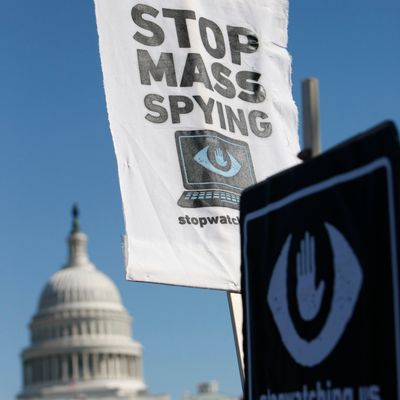
For several months, Glenn Greenwald has been hinting that the next bombshell from the Edward Snowden files will name Americans being spied on by the government, and early on Wednesday morning he delivered. The Intercept reports that five Muslim-Americans were targeted for surveillance by the FBI and NSA, though the respected lawyers, civil rights activists, and professors hold moderate views. The five men appear on a spreadsheet provided by Snowden of 7,485 email addresses that were under surveillance between 2002 and 2008. Specific information about why they were targeted and the extent of the government’s monitoring are classified, but while the NSA said in a statement that “no U.S. person can be the subject of FISA surveillance based solely on First Amendment activities,” it’s hard to see why else they would be singled out. It appears that their communications were monitored for long periods of time, but none of them have been linked to terrorist activity, or charged with any other crime.
The five men identified by The Intercept, with their consent, are: Asim Ghafoor, an attorney who has worked on Capitol Hill and represented clients accused of terrorism-related activity, Hooshang Amirahmadi, a professor of international relations at Rutgers University who has criticized the United States’ policy toward Iran, Agha Saeed, a civil rights activist and former political science professor at California State University, Nihad Awad, the executive director of the Council on American-Islamic Relations, and Faisal Gill, a lawyer and Republican Party operative who ran for a seat in Virginia’s legislature in 2007.
Gill’s inclusion on the list is particularly troubling, as he served as a JAG officer in the Navy, obtained a top-secret security clearance as a senior policy adviser to the Department of Homeland Security under the George W. Bush administration, and was cleared of any wrongdoing in two DHS investigations. The surveillance began around the time Gill left the government to form a law firm with Ghafoor. They represented the government of Sudan in U.S. court, but the names of the many non-Muslim lawyers who represented Sudan, and other foreign governments, don’t appear on the list. “I was a very conservative, Reagan-loving Republican,” Gill says. “If somebody like me could be surveilled, then [there are] other people out there I can only imagine who are under surveillance.”
As part of their attempt to determine why the five men were monitored, The Intercept spoke with John Guandolo, a former FBI counterterrorism official who worked on similar investigations and claims he developed an agency training program on monitoring the Muslim Brotherhood. Guandolo suggested there are “hundreds” of secret Muslim Brotherhood operatives in the United States, and made vague accusations about the five men being “jihadis” and senior officials in the organization. That puts them in good company, as Guandolo has also claimed recently that CIA director John Brennan secretly converted to Islam and is a tool of the Saudi government.
While other intelligence officials say Guandolo’s views weren’t representative of the agencies, The Intercept highlights one blatant example of discrimination against Muslims. A 2005 document that explains how to fill out internal memos justifying FISA surveillance uses the name “Mohammed Raghead” for a fictitious target. An NSA spokeswoman responded that the agency “has not and would not approve official training documents that include insulting or inflammatory language.”
In addition to igniting more debate about alleged discrimination and privacy abuses by U.S. intelligence agencies, the revelations could mark a significant turn in the legal challenge to government surveillance programs. In the past, such cases have been dismissed because the plaintiffs could not prove that they were personally targeted by the government, but now there are at least five specific examples. Also, the public can finally put faces to the many reports over the last year about Americans being spied on by their own government en masse. “I think all Americans should be worried about NSA surveillance and the targeting of American Muslims,” Nihad Awad says. “Because if it is American Muslims today, it is going to be them next.”






























